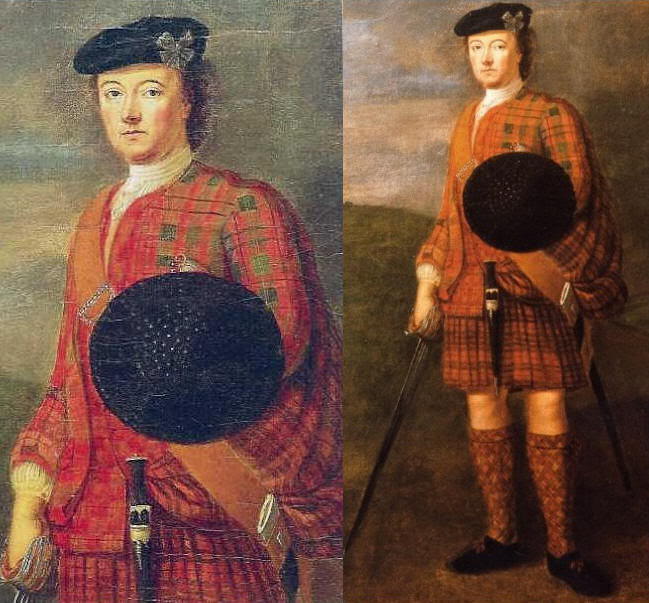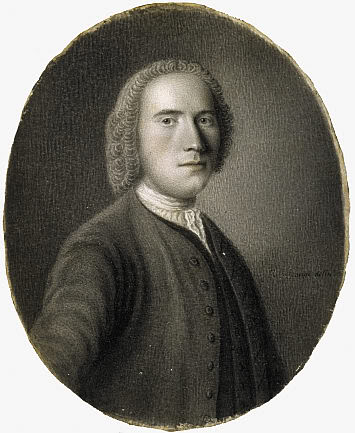Scottish Jacobite general, fifth son of John, 1st duke of Atholl by his first wife, Catherine, daughter of the 3rd duke of Hamilton, was born at Huntingtower, near Perth, on the 4th of October 1694. He joined the army in Flanders in June 1712; in 1715, contrary to their fathers wishes, he and his brothers, the marquis of Tullibardine and Lord Charles Murray, joined the Jacobite rebels under the earl of Mar, each brother commanding a regiment of men of Atholl. Lord Charles was taken prisoner at Preston, but after the collapse of the rising Lord George escaped with Tullibardine to South Uist, and thence to France. In 1719 Murray took part in the Jacobite attempt in conjunction with the Spaniards in the western highlands, under the command of Tullihardine and the earl marischal, which terminated in the affair of Glenshiel on the 10th of June, when he was wounded while commanding the right wing of the Jacobites. After hiding for some months in the highlands he reached Rotterdam in May I72o. There is no evidence for the statement that Murray served in the Sardinian army, and little is known of his life on the continent till 1724, when he returned to Scotland, where in the following year he was granted a pardon. The duke of Atholl died in 1724 and was succeeded in the title by his second son James, owing to the attainder of Tullibardine; and Lord George leased from his brother the old family property of Tuilibardine in Strathearn, where he lived till 1745.

On the eve of the Jacobite rising of 1745 the duke of Perth made overtures to Lord George Murray on behalf of the Pretender; but even after the landing of Charles Edward in Scotland in July, accompanied by Tullibardine, Murrays attitude remained doubtful. He accompanied his brother the duke to Crieff on the 21st of August to pay his respects to Sir John Cope, the commander of the government troops, and he permitted the duke to appoint him deputy-sheriff of Perthshire. It has been suggested that Murray acted with duplicity, but his hesitation was natural and genuine; and it was not till early in September, when Charles Edward was at Blair Castle, which had been vacated by the duke of Atholl on the princes approach, that Murray decided to espouse the Stuart cause. He then wrote to his brother explaining that he did so for conscientious reasons, while realizing the risk of ruin it involved. On joining the Jacobite army Lord George received a commission as lieutenant-general, though the prince ostentatiously treated him with want of confidence; and he was flouted by the Irish adventurers who were the Pretenders trusted advisers.
At Perth Lord George exerted himself with success to introduce discipline and organization in the army he was to command, and he gained the confidence of the highland levies, with whose habits and methods of fighting he was familiar. - He also used his influence to prevent .the exactions and arbitrary interference with civil rights which Charles was too ready to sanction on the advice of others.
At Prestonpans, on the 21st of September, Lord George, who led the Jacobite left wing in person, was practically commander-in-chief, and it was to his able generalship that the victory was mainly due. During the six weeks occupation of Edinburgh he did useful work in the further organization and disciplining of the army. He opposed Charless plan of invading England, and when his judgment was overruled he prevailed on the prince to march into Cumberland, which he knew to be favorable ground for highlander tactics, instead of advancing against General Wade, whose army was posted at Newcastle. He conducted the siege of Carlisle, but on the surrender of the town on the I4th of November he resigned his command on the ground that his auth~rity had been insufficiently upheld by the prince, and he obtained permission to serve as a volunteer in the ranks of the Atholl levies. The dissatisfaction, however, of the army with the appointment of the duke of Perth to succeed him compelled Charles to reinstate Murray, who accordingly commanded the Jacobites in the march to Derby. Here on the 5th of December a council was held at which Murray urged the necessity for retreat, owing to the failure of the English Jacobites to support the invasion and the absence of aid from France. As Murray was supported by the council the retreat was ordered, to the intense chagrin of Charles, who never forgave him; but the failure of the enterprise was mainly chargeable to Charles himself, and it was not without justice that Murrays aide de camp, the chevalier Johnstone, declared that had Prince Charles slept during the whole of the expedition, and allowed Lord George Murray to act for him according to his own judgment, he would have found the crown of Great Britain on his head when he awo~e~~~
Lord George commanded the rear-guard during the retreat; and this task, rendered doubly dangerous by the proximity of Cumberland in the rear and Wade on the flank, was made still more difficult by the incapacity and petulance of the Pretender. By a skilfully fought rearguard action at Clifton Moor, Lord George enabled the army to reach Carlisle safely and without loss of stores or war material; and on the 3rd of January 1746 the force entered Stirling, where they were joined by reinforcements from Perth. The prince laid siege to Stirling Castle, while Murray defeated General Hawley near Falkirk; but the losses of the Jacobites by sickness and desertion, and the approach of Cumberland, made retreat to the Highlands an immediate necessity, in which the prince was compelled to acquiesce; his resentment was such that he gave ear to groundless suggestions that Murray was a traitor, which the latters failure to capture his brothers stronghold of Blair Castle did nothing to refute.
In April 1746 the Jacobite army was in the neighborhood of Inverness, and the prince decided to give battle to the duke of Cumberland. Charles took up a position on the left bank of the Nairn river at Culloden Moor, rejecting Lord Georges Murray advice to select a much stronger position on the opposite bank. The battle of Culloden, where the Stuart cause was ruined, was fought on the 16th of April 1746. On the following day the duke of Cumberland intimated to his troops that the public orders of the rebels yesterday was to give us no quarter ; Hanoverian news-sheets printed what purported to be copies of such an order, and the historian James Ray and other contemporary writers gave further currency to a calumny that has been repeated by modern authorities. Original copies of Lord George Murrays orders at Culloden are in existence, one of which is among Cumberlands own papers, while another was in the possession of Lord Hardwicke, the judge who tried the Jacobite peers in 1746, and they contain no injunction to refuse quarter. After the defeat Murray conducted a remnant of the Jacobite army to Ruthven, and prepared to organize further, resistance. Prince Charles, however, had determined to abandon the enterprise, and at Ruthven Lord George received an order dismissing him from the princes service, to which he replied in a letter upbraiding Charles for his distrust and mismanagement. Charless belief in the generals treachery was shared by several leading Jacobites, but there appears no ground for the suspicion. From the moment he threw in his lot with the exiled princes cause Lord George Murray never deviated in his loyalty and devotion, and his generalship was deserving of the highest praise; but the discipline he enforced and jealousy of his authority made enemies of some of those to whom Charles was more inclined to listen tharf ,to the general who gave him sound but unwelcome advice.

Lord George Murray, by Sir Robert Strange.
- This sensitive miniature was drawn by Robert Strange, himself an ardent Jacobite who was present throughout the campaign.
Murray escaped to the continent in December 1746, and was graciously received in Rome by the Old Pretender, who granted him a pension; but in the following year when he went to Paris Charles Edward refused to see him. Lord George lived at various places abroad until his death, which occurred at Medemblik in Holland on the 11th of October 1760. He married ill 1728 Amelia, daughter and heiress of James Murray of Strowan and Glencarse, by whom he had three sons and two daughters. His eldest son John became 3rd duke of Atholl in 1764; the two younger sons became lieutenant-general and vice-admiral respectively in the British service.
See A Military History of Perthslzire, ed. by the marchioness of Tullibardine (2 vols., London, 1908), containing a memoir of Lord George Murray and a facsimile copy of his orders at Culloden; The A thoU Chronicles, ed. by the duke of Atholl (privately printed);
The Chevalier James de Johnstone, Memoirs of the Rebellion in 1745
(3rd ed, London, 1822); James Ray, Corn pleat Historie of the Rebellion, 1745-1746 (London, 1754); Robert Fatten, History of the late Rebellion (2nd ed., London, 1717); Memoirs of Sir John Murray of Jiroughton, ed. by R. F. Bell (Edinburgh, 1898); Andrew Henderson, History of the Rebellion, 1745-1746 (2nd ed., London, 1748).
(R. J. M.)
http://50.1911encyclopedia.org/M/MU/MURRAY_LORD_GEORGE.htm
-Skirmish at Clifton Moor - 18 Dec. 1745
Lord George Murray made several narrow escapes. Old Glenbucket, who, from infirmity, remained at the end of the village on horseback, had lent him his target, and it was fortunate for Lord George that he had done so. By means of this shield, which was convex, and covered with a plate of metal painted, his lordship protected himself from the bullets of the dragoons, which cleared away the paint off the target in several places.
http://www.electricscotland.com/history/charles/44.htm